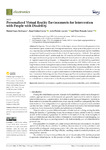Personalized Virtual Reality Environments for Intervention with People with Disability

Use this link to cite
http://hdl.handle.net/2183/30908Collections
- Investigación (FIC) [1678]
Metadata
Show full item recordTitle
Personalized Virtual Reality Environments for Intervention with People with DisabilityDate
2022Citation
Lagos Rodríguez, M.; García, Á.G.; Loureiro, J.P.; García, T.P. Personalized Virtual Reality Environments for Intervention with People with Disability. Electronics 2022, 11, 1586. https://doi.org/10.3390/electronics11101586
Abstract
[Abstract] Background: Virtual reality (VR) is a technological resource that allows the generation of an environment of great realism while achieving user immersion. The purpose of this project is to use VR as a complementary tool in the rehabilitation process of people with physical and cognitive disabilities. An approach based on performing activities of daily living is proposed. Methods: Through joint work between health and IT professionals, the VR scenarios and skills to be trained are defined. We organized discussion groups in which health professionals and users with spinal injury, stroke, or cognitive impairment participated. A testing phase was carried out, followed by a qualitative perspective. As materials, Unity was used as a development platform, HTC VIVE as a VR system, and Leap Motion as a hand tracking device and as a means of interacting with the scenarios. Results: A VR application was developed, consisting of four scenarios that allow for practicing different activities of daily living. Three scenarios are focused on hand mobility rehabilitation, while the remaining scenario is intended to work on a cognitive skill related to the identification of elements to perform a task. Conclusions: Performing activities of daily living using VR environments provides an enjoyable, motivating, and safe means of rehabilitation in the daily living process of people with disabilities and is a valuable source of information for healthcare professionals to assess a patient’s evolution.
Keywords
Immersive environment
Cognitive impairment
Physical disability
Unity
Rehabilitation
Cognitive impairment
Physical disability
Unity
Rehabilitation
Editor version
Rights
Atribución 4.0 Internacional






